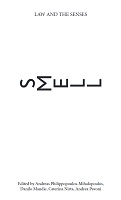SMELL
| dc.contributor.editor | Philippopoulos-Mihalopoulos, Andreas | |
| dc.contributor.editor | Mandic, Danilo | |
| dc.contributor.editor | Nirta, Caterina | |
| dc.contributor.editor | Pavoni, Andrea | |
| dc.date.accessioned | 2023-12-12T08:35:21Z | |
| dc.date.available | 2023-12-12T08:35:21Z | |
| dc.date.issued | 2023 | |
| dc.identifier | OCN: 1412751095 | |
| dc.identifier.uri | https://library.oapen.org/handle/20.500.12657/86054 | |
| dc.description.abstract | Although somewhat marginal in relation to the other senses, smell is the most potent way of anchoring ourselves to the world. We subconsciously find our place in it by sniffing our body, the body of the one next to us, the room in which we are, the culture with which we are familiar. There is an incessant olfactory flow consisting of bodies, human and nonhuman, that are agents of generation, consumption, diffusion, reproduction and dissolution of odours. As they move or pause, as they cluster with others or try to move away, these bodies constantly partake in this olfactory flow, this dense planetary swirl that leaves nothing outside. The law aims at presenting itself as rational and objective. Smell, on the other hand, is one of the least integrated senses in the legal edifice, in comparison to, say, seeing and hearing. This can be attributed mainly to the fact that sense-making of smell and law are different, even antithetical. Smell operates undercurrent, tickling the olfactory antennas of individual and collective bodies while habitually hiding behind other sensory volumes. Law, on the other hand, has an interest in appearing present, universal, constant. Olfactory sense-making relies on its elusiveness; legal sense-making invests in its obviousness. Yet, the two can interact in most unexpected ways, as this volume amply shows. If anything, smell airs the way in which law conceptualises and contextualises its own actuality. Smell brings law forth by allowing it to show its underbelly, its elusive sense-making that is invariably sacrificed in preference to the necessity of legal impressions of constancy. However, smell’s fragmentary, discontinuous and unstable nature, despite all the ordering that goes to it, poses a peculiar challenge to the law. This volume sets out to investigate this juncture. | en_US |
| dc.language | English | en_US |
| dc.subject.other | Posthuman; Sound; Materiality; Hearing; Senses; Law | en_US |
| dc.title | SMELL | en_US |
| dc.type | book | |
| oapen.identifier.doi | 10.16997/book68 | en_US |
| oapen.relation.isPublishedBy | 2725c638-53f3-4872-9824-99c3555366f3 | en_US |
| oapen.relation.isbn | 9781915445155 | en_US |
| oapen.relation.isbn | 9781915445131 | en_US |
| oapen.relation.isbn | 9781915445148 | en_US |
| oapen.pages | 349 | en_US |
| oapen.place.publication | London | en_US |

